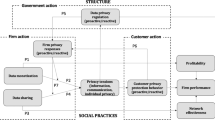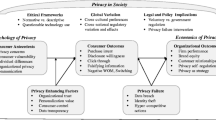Abstract
Against the legal backdrop of proceedings against Google in various jurisdictions regarding the layout of its search result page, this article presents the results of a survey of a representative sample of 1014 Australian consumers, investigating their use of the Internet and specifically Google’s search engine, and the implications of these findings for consumer law and policy concerning the operation of search engines. The study is the first of its kind in Australia, despite litigation against Google in this jurisdiction for alleged misleading and deceptive conduct. The survey findings indicate that consumers have a lack of understanding about the operation and origin of the different elements of the Google search engine. In particular, the findings show particular confusion in relation to the operation and origin of Google’s related vertical services. Such confusion seems to be more pronounced among older respondents and those without higher education qualifications, although the survey revealed some more surprising and unexpected results in terms of the demographics of confusion. These findings are important for several reasons. Firstly, they identify and point to a gap in consumer knowledge about Google search that should be addressed, presenting an opportunity for consumer education in this area. Secondly, this research challenges the widely held assumption that the average (Australian) Internet user has a basic understanding about the operation and function of the Google search engine. Thirdly, the results leave open the possibility for further proceedings against Google in Australia on the basis of consumer law, the decision in Google v ACCC notwithstanding. This points to the potential for a more active role for consumer law in the digital ecosystem to address problems emanating from large and powerful platform providers such as Google than it previously has occupied.






Similar content being viewed by others
References
Alboukrek, K. (2003). Adapting to a new world of E-commerce: The need for uniform consumer protection in the international electronic marketplace. George Washington International Law Review, 35, 425–460.
Andrews, L. (2016). We need European regulation of Facebook and Google. openDemocracy. Retrieved from https://www.opendemocracy.net/uk/leighton-andrews/we-need-european-regulation-of-facebook-and-google
Bechtold, S., & Tucker, C. (2014). Trademarks, triggers, and online search. Journal of Empirical Legal Studies, 11, 718–750.
Coorey, A. (2016). The ACCC, the internet and extraterritorial injunctions. Australian Journal of Competition and Consumer Law, 24, 214–221.
Daly, A. (2014). Dominating search: Google before the law. In R. König & M. Rasch (Eds.), Society of the Query Reader: Reflections on web search (pp. 86–104). Amsterdam: Institute of Network Cultures.
Daly, A. (2016). Private power, online information flows and EU law: Mind the gap. Oxford: Hart.
Digital Summit. (2015) Google Maintain their Stranglehold over the Australian Search Engine Market in 2014. January 9. Retrieved from http://www.digitalsummit2013.com.au/google-maintain-their-stranglehold-over-the-australian-search-engine-market-in-2014/.
Dinner, I. M., Van Heerde, H. J., & Neslin, S. A. (2014). Driving online and offline sales: The Cross-Channel effects of traditional, online display, and paid search advertising. Journal of Marketing Research, 51(5), 527–545.
Drexl, J. (2017). Economic efficiency versus democracy: On the potential role of competition policy in regulating digital Markets in Times of post-truth politics. In D. Gerard & I. Lianos (Eds.), Competition Policy: Between Equity and Efficiency (forthcoming). Cambridge: Cambridge University Press.
Elkin-Koren, N., & Salzberger, E. (2004). Law and economics of cyberspace: The effects of cyberspace on the economic analysis of law. Cheltenham: Edward Elgar.
eMarketer. (2016). Digital ad spending to surpass TV next year.
European Data Protection Supervisor (EDPS). (2014). Privacy and competitiveness in the age of big data: The interplay between data protection, competition law and consumer protection in the Digital Economy. Preliminary Opinion of the European Data Protection Supervisor. March 2014. Brussels. Retrieved from https://secure.edps.europa.eu/EDPSWEB/webdav/site/mySite/shared/Documents/Consultation/Opinions/2014/14-03-26_competitition_law_big_data_EN.pdf
European Data Protection Supervisor (EDPS). (2016). EDPS Opinion on coherent enforcement of fundamental rights in the age of big data. Opinion 8/2016. Brussels. Retrieved from https://secure.edps.europa.eu/EDPSWEB/webdav/site/mySite/shared/Documents/Consultation/Opinions/2016/16-09-23_BigData_opinion_EN.pdf
Evans, D. (2009). The online advertising Industry: Economics, evolution, and privacy. Journal of Economic Perspectives, 23(3), 37–60.
Ewing, S., van der Nagel, E., & Thomas, J. (2014). CCi digital futures 2014 The Internet in Australia. Policy Report. Melbourne: ARC Centre of Excellence for Creative Industries and Innovation Swinburne University of Technology. Retrived from http://researchbank.swinburne.edu.au/vital/access/services/Download/swin:41844/SOURCE1
Federal Trade Commission. (2012). Google will pay $22.5 million to settle FTC charges it misrepresented privacy assurances to users of Apple’s Safari Internet Browser. Washington DC. Retrieved from https://www.ftc.gov/news-events/press-releases/2012/08/google-will-pay-225-million-settle-ftc-charges-it-misrepresented
Federal Trade Commission. (2013a). FTC consumer protection staff updates agency’s guidance to search engine industry on the need to distinguish between advertisements and search results. Washington DC. Retrieved from https://www.ftc.gov/news-events/press-releases/2013/06/ftc-consumer-protection-staff-updates-agencys-guidance-search
Federal Trade Commission. (2013b). Statement of the Federal Trade Commission regarding Google’s search practices In the matter of Google inc. FTC File Number 111–0163. Washington, DC. https://www.ftc.gov/system/files/documents/public_statements/295971/130103googlesearchstmtofcomm.pdf.
Fisher, D. (2015). Google Books survives copyright challenge as fair use. Forbes. Retrieved from http://www.forbes.com/sites/danielfisher/2015/10/16/google-books-survives-copyright-challenge-as-fair-use/
Floridi, L. (2016). Fake news and a 400-year-old problem: We need to resolve the ‘post-truth’ crisis. The Guardian. Retrieved from https://www.theguardian.com/technology/2016/nov/29/fake-news-echo-chamber-ethics-infosphere-internet-digital
Franklyn, D. J., & Hyman, D. A. (2013a). Trademarks as search engine keywords: Much ado about something? Harvard Journal of Law & Technology, 26(2), 481–543.
Franklyn, D.J. & Hyman, D.A. (2013b). Review of the likely effects of Google’s proposed commitments dated October 21, 2013 (“Second Commitments”). Report. Brussels: Fair Search. http://www.fairsearch.org/wp-content/uploads/2013/12/FairSearch-Hyman_Franklyn-Study.pdf
Helberger, N., Loos, M. B. M., Mak, C., & Pressers, L. (2013). Digital content contracts for consumers. Journal of Consumer Policy, 36(1), 37–57.
Henry, P. (2005). Empowering consumers to make better decisions, or strengthening marketers’ potential to persuade. In P. C. Haugtvedt, K. A. Machleit, & R. Yalch (Eds.), Online consumer psychology: Understanding and influencing consumer behavior in the virtual world (pp. 323–336). Hove: Psychology Press.
Huang, V., Weatherall, K., & Webster, E. (2012). The use of survey evidence in Australian trade mark and passing off cases. In A. T. Kenyon, M. Richardson, & W. L. Ng-Loy (Eds.), The law of reputation and Brands in the Asia Pacific (pp. 181–202). Cambridge: Cambridge University Press.
Ibanez Colomo, P. (2014). Exclusionary discrimination under article 102 TFEU. Common Market Law Review, 51(1), 141–163.
Incardona, R., & Poncibo, C. (2007). The average consumer, the unfair commercial practices directive and the cognitive revolution. Journal of Consumer Policy, 30, 21–38.
Interactive Advertising Bureau. (2016). IAB Internet Advertising Revenue Report. Retrieved from https://www.iab.com/news/q3-2016-internet-ad-revenues-hit-17-6-billion-climbing-20-year-year-according-iab/
Interflora Inc v Marks and Spencer Plc. (2013). EWHC, 1291.
Internet World Stats. (2017). Internet Usage Statistics.
Introna, L. D., & Nissenbaum, H. (2000). Shaping the web: Why the politics of search engines matter. Information Society, 16(3), 169–185.
Joined Cases C-236/08 – C-238/08 Google France SARL, Google Inc v Louis Vuitton Malletier SA, Google France SARL v Viaticum SA, Luteciel SARL, Google France SARL v Centre national de recherche en relations humaines (CNRRH) SARL, Pierre-Alexis Thonet, Bruno Raboin, Tiger SARL [2010] ECR I-02417.
Jyrkkiö, L. (2011). But I still haven’t found what I’m looking for’ – The ECJ and the use of competitor’s Trademark in search engine keyword advertising. Helsinki Law Review, 1.
Lindsay, D. (2014). The ‘right to be forgotten’ by search engines under data privacy law: A legal analysis of the Costeja ruling. Journal of Media Law, 6, 159–179.
Loos, M., & Luzak, J. (2016). Wanted, a bigger stick: On unfair terms in consumer contracts with online service providers. Journal of Consumer Policy, 39(1), 63–90.
Lynskey, O. (2015). Control over personal data in a digital age: Google Spain v AEPD and Mario Costeja Gonzalez. Modern Law Review, 78(3), 522–534.
Marsden, C. (2013). Network neutrality: A research guide. In I. Brown (Ed.), Research handbook on governance of the internet (pp. 419–444). Cheltenham: Edward Elgar.
McWilliam’s Wines Pty Ltd v McDonald’s System of Australia Pty Ltd (1980) 33 ALR 394.
Mik, E. (2016). The erosion of autonomy in online consumer transactions. Law. Innovation and Technology, 8(1), 1–38.
Momtaz, M. (2011). Google shopping released in Australia. Margin Media. Retrived from http://blog.marginmedia.com.au/Our-Blog/bid/55791/Google-Shopping-released-in-Australia
Ofcom. (2015). Children and parents: Media use and attitudes report. London: Ofcom. Retrieved from http://stakeholders.ofcom.org.uk/market-data-research/other/research-publications/childrens/children-parents-nov-15/.
Ofcom. (2016). Adults’ media use and attitudes. London: Ofcom. Retrieved from http://stakeholders.ofcom.org.uk/binaries/research/media-literacy/adults-literacy-2016/2016-Adults-media-use-and-attitudes.pdf.
Pasquale, F. (2006). Rankings, Reductionism, and Responsibility. Seton hall public law research paper no. 888327. South Orange.
Ramcharran, H. (2013). E-commerce growth and the changing structure of the retail sales Industry. International Journal of E-Business Research, 9(2), 46–60.
Ranchordas, S. (2015). Does sharing mean caring? Regulating innovation in the sharing economy. Minnesota Journal of Law, Science & Technology, 16(1), 413–475.
Richardson, M. (2012). Before the high court: Why policy matters: Google Inc v Australian Competition and Consumer Commission. Sydney Law Review, 34, 587–598.
Rosetta Stone Ltd v Google Inc, 676 F 3d 144 (4th Cir, 2012).
Rothchild, J. (1999). Protecting the digital consumer: The limits of cyberspace utopianism. Indiana Law Journal, 74, 3, 895–998.
Samat, S. (2013). “Introducing shopping campaigns: A better way to promote your products on Google.” Google Commerce Blog. Retrieved from http://googlecommerce.blogspot.com.au/2013/10/introducing-shopping-campaigns-better.html
Scardamaglia, A. (2013). Misleading and deceptive conduct and the internet: Lessons and loopholes in Google Inc v Australian Competition and Consumer Commission. European Intellectual Property Review, 35, 707–713.
Scardamaglia, A. (2014). Keywords, Trademarks and search engine liability. In R. König and M. Rasch (Eds.), Society of the query reader: Reflections on web search. Amsterdam: Institute of Network Cultures.
Solove, D., & Hartzog, W. (2014). The FTC and the new common law of privacy. Columbia Law Review, 114, 583–676.
Sterling, G. (2016). Search engine ads generated 50 percent of digital revenue in first half of 2016. Search Engine Land. Retrieved from http://searchengineland.com/search-ads-1h-generated-16-3-billion-50-percent-total-digital-revenue-262217
Swire, P. (2009). No cop on the beat: Underenforcement in E-commerce and cybercrime. Journal on Telecommunications and High-Technology Law, 7, 107–126.
Van Allen, F. (2014). Google, others ignoring FTC warnings on deceptive search ads. Techlicious. Retrieved from http://www.techlicious.com/blog/ben-edelman-google-deceptive-search-ads/
Vaughan, L., & Thelwall, M. (2004). Search engine coverage bias: Evidence and possible causes. Information Processing and Management, 40(4), 693–707.
Zuboff, S. (2015). Big other: Surveillance capitalism and the prospects of an information civilization. Journal of Information Technology, 30, 75–89.
Acknowledgments
The authors would like to thank Dr Rachel Batty for her research assistance and the participants at the Melbourne Law School Empirical Studies in Trade Marks Junior Scholars Forum (December 2014), Scott Ewing and Nicola Howell for their thoughtful comments. Thanks also to David Bednall, Civilai Leckie and Vicki Huang for their time and assistance in the survey design process. This research was supported by grants from Swinburne Faculty of Health, Arts and Design and Swinburne Faculty of Business & Law.
Author information
Authors and Affiliations
Corresponding author
Rights and permissions
About this article
Cite this article
Daly, A., Scardamaglia, A. Profiling the Australian Google Consumer: Implications of Search Engine Practices for Consumer Law and Policy. J Consum Policy 40, 299–320 (2017). https://doi.org/10.1007/s10603-017-9349-9
Received:
Accepted:
Published:
Issue Date:
DOI: https://doi.org/10.1007/s10603-017-9349-9




